- Home
- J. R. Ward
The Billionaire Page 2
The Billionaire Read online
Page 2
Frick blinked. “Ah, yes, sir.”
“Call my assistant tomorrow morning. She’ll put you in touch with the Condi-Food analysts and they’ll find you a little slice of the deal to work on. Don’t worry about your boss. I’ll call Harry and tell him you’re going to come play with me for a while.”
As their eyes bugged as if they’d been goosed by a pair of pliers, Sean smiled. Man, he remembered what that felt like. To be young and green and desperate to be given a shot at the big time…and have a door opened.
The thank-yous from them started to roll fast as marbles on a bare floor. “No problem,” Sean said, then narrowed his eyes. “Just stay tight and use your brains and everything will be fine.”
He turned his attention to Elena. She looked very beautiful tonight, dressed in a red sheath with her hair up high on her head. Rubies glowed from her neck and her earlobes.
“Sean,” she said with her lovely accent, “I have a favor to ask you.”
“What, baby?” As she smiled, he had to imagine that no one ever called her baby. She was a descendent of the Medicis and as rich as her ancestors had been back in the Middle Ages. The thing was, though, in spite of her bloodline and her money, she was a very nice person. They’d met years ago and had shared an immediate, mutual respect.
“Excuse me,” one of the photographers cut in. “May I take a picture?”
Sean flipped into social mode, gathering Elena against him and staring into the lens. There was a flash, a thank-you from the guy, and then he and Elena went back to their conversation.
“What kind of favor do you need?” Sean asked.
“An escort to the Hall Foundation Gala.”
Oh, okay, he knew what this was all about. Her recent marital separation had been messy and public and had involved infidelity on her husband’s side. To top it off, the guy was trying to suck tens of millions of dollars out of her in the divorce…despite the fact that he was still with the masseuse he’d gotten pregnant.
The details of the split had been written up in Vanity Fair and New York Magazine, but that wasn’t the worst of it. Everyone on the A-list circuit was talking about what had happened and not with kindness. They were whispering that Elena had gone out and bought herself a younger man then hadn’t been able to keep him. And that he’d wandered because she couldn’t have children. And that Elena was a cold fish.
Sean didn’t know about the kids part, but he was certain that she’d been passionately in love with her husband when they’d gotten married. Too bad everyone else seemed to have forgotten that.
God, Manhattan could be a very cold place even if you lived in a penthouse on Park Avenue with perfectly good heating and ventilation. All it took was for your private life to become the scandal du jour and you became fodder, not friend. And gossip was like chum to the social sharks, sure to attract a frenzy.
If Elena didn’t show up at the Hall Foundation Gala? She’d look as if she were weak and that would only incite the harping more. But if she arrived at the event with him, she’d appear strong and desirable.
He reached out and took her hand. “I’m there for you. One hundred percent.”
She positively sagged with relief. “Thank you. This has been a very difficult time.”
He pulled her forward and tucked her into his body as a friend or a brother would, for comfort. “You don’t worry about a thing.”
When his phone started to ring in his breast pocket, he took it out. The 617 area code made him frown because he didn’t recognize the rest of the caller’s number.
“I’ll let you take that,” Elena said, kissing him on the cheek. “And seriously, Sean…thank you.”
“Don’t go, baby. This’ll just take a sec.” He accepted the call. “Yeah?”
The pause that followed was broken by the wail of an ambulance siren. Then a female voice said, “Sean O’Banyon?”
“Who is this and how did you get this number?”
“My name is Elizabeth Bond. I got it from your voice mail. I’m…I’m so very sorry to tell you this…but your father has passed.”
All at once, the sounds of the party drained away. The patter of talk, the winding chords of the chamber orchestra, the trilling laughter of a woman nearby—all of it disappeared as if someone had thrown a thick blanket over everything. And then the sight of the 150 people before him fogged out until he was alone in the vast room.
In fact, the very fabric of reality disintegrated until it seemed as if the world had become an intangible dreamscape and him a formless vapor: he couldn’t feel the floor under his feet or the phone in his palm or the weight of his body. Nor could he remember what he was doing in this room full of crystal chandeliers and too much perfume.
“When?” The heavy word came out of his mouth without benefit of conscious thought.
“Less than an hour ago. He suffered a second heart attack.”
“When was the first?”
“Six days ago.”
“Six days ago?” he asked in an utterly level tone.
There was a hesitation, as if the woman on the other end was unsure what his mental state was. Funny, that made two of them.
She cleared her throat. “Immediately following his first, he was taken by ambulance here to Mass General, and though he was revived, the damage to his heart muscle was extensive. Following an angiogram, it was revealed that he had multiple blockages, but he was not stable enough for surgery.”
Dimly, Sean heard the sound of ice tinkling in a glass and he looked down. His hand was shaking so badly his Tanqueray and tonic might as well have been in a blender. He leaned to the side and put the drink down on a table.
“What happens to him now?” he asked, shoving his hand in his pocket.
“He will be held here at Mass General until the family makes arrangements.” When he didn’t respond, she said, “Mr. O’Banyon? Will you be making arrangements? Um…hello?”
“Yes, I will. I’ll fly up tonight. What do I need to do once I’m at the hospital?” As she proceeded to tell him who to call and where to go at MGH, he wasn’t tracking. The only thing that stuck was that he could phone the general information number if he needed help or had further questions.
“I’m very sorry,” the woman said and she obviously meant it. There was true sorrow in her voice. “I—”
“Are you a nurse?”
“Yes, I am. But your father wasn’t a patient of mine. He was—”
“Thank you for calling me. If you’ll excuse me, I need to make some calls. Goodbye.”
He hung up and stared at his phone. Obviously his father had listed him as next of kin, which explained how the woman had gotten the number.
“Sean? Is everything all right?”
He glanced at Elena. It took a moment or two for him to recognize her, but eventually her worried mahogany eyes got through to him. “My father is dead.”
As she gasped and put her hand on his arm, a booming voice barreled through the crowd at them. “Sean O’Banyon, as I live and breathe!”
Sean turned to see the owner of a shipping conglomerate lumbering over like a bear through the woods. The man was as ungainly as the mega-ton freight haulers he put out on the oceans and he had the mouth of a longshoreman. In typical Manhattan fashion, he was welcome here tonight only because he’d given five million dollars to the cause.
“I’ll handle him,” Elena whispered. “You, go now.”
Sean nodded and took off, heading for the back exit while trying to dodge all the people who wanted things from him. As he fought through the crowd, he felt as if he couldn’t breathe and a curious panic set in.
When he finally burst outside through a fire door, he had to lean down and put his hands on his knees. Drawing the sultry summer air down his throat and into his lungs only made the suffocation worse and he wrenched at his tie.
Dead. His father was dead.
He and his brothers were finally free.
Sean forced himself to stand up like a man and pushed
a hand through his hair to try and clear his brain. Yeah…freedom had come with that phone call.
Hadn’t it?
Tilting his head back, he measured the lack of stars in the sky and thought about the inflection in the nurse’s words, the sadness and the regret.
How appropriate that the person mourning his father was a stranger.
God knew, his sons would never be able to.
CHAPTER TWO
Lizzie hung up her cell phone and stared at the thing. Through the din of what sounded like a party, Mr. O’Banyon’s son had been totally detached, his voice giving away no emotion at all. Then again, she was a stranger and the news had not been good or expected. He was no doubt in shock.
She’d wanted to find out when and where the funeral would be held, but that hadn’t seemed like an appropriate thing to bring up. Worst came to worst she could always call him later.
An ambulance went by her, its lights flashing red and white, its siren letting out a single squawk as it left the Mass General complex and headed out onto Cambridge Avenue. The sight of it got her moving and she started for the parking garage. Part of her wanted to stay here and wait for the son to arrive, but it would take him hours to get into town. Plus it appeared that he was the type who’d rather deal with things on his own.
Besides, it was time to go to her second job.
Lizzie jogged across the road and took two flights of concrete stairs up to the second story of the garage. When she found her old Toyota Camry in the lines of cars, she unlocked it with a key as the remote no longer worked, and put Mr. O’Banyon’s things on the backseat. Getting behind the wheel, she figured she’d leave the bag by the upstairs apartment’s door for the son along with a note that if there was anything she could do to help she was always available.
The drive from Beacon Hill to Chinatown took her on a straight shot up Charles Street, then a jog around the Commons, followed by a scoot past Emerson College. Down farther, opposite one of the Big Dig’s gaping mouths, was Boston Medical Center. Affiliated with Boston University, BMC was a busy urban hospital and its emergency department saw a lot of action. Particularly, and tragically, of the gunshot and stabbing variety.
She’d been moonlighting in the ED three nights a week for the past year because, though she worked days at the health clinic in Roxbury, she needed the extra income. Her mother lived in an artist’s world of color and texture and not much reality, so Lizzie helped her out a lot, covering her expenses, paying bills, making sure she had enough money. To Alma Bond, the world was a place of beauty and magic; practical matters rarely permeated her fog of inspiration.
The extra income was also for Lizzie, however. Earlier in the year, she’d applied and been accepted into a master’s program for public health. Though she couldn’t afford to start this fall, her plan was to save up over the next few months and matriculate in the winter session.
Except now she wondered whether she needed to find a new place to live. Would Mr. O’Banyon’s son hold on to the duplex? If he sold it, would her new landlord ask for more in rent? How would she find something equally inexpensive?
After driving through BMC’s parking garage, Lizzie squeezed the Toyota in between two mountain-size SUVs and took a last look at Mr. O’Banyon’s things. Then she got out, locked the car and strode toward the bank of elevators.
As she waited for the metal doors to slide open, Sean O’Banyon’s hard tone and emotionless words came back to her.
Maybe that hadn’t been shock. Maybe that had been genuine disregard.
God, what could cause a father and son to lose touch to such a degree?
* * *
It was 3:16 in the morning when Sean stopped his rental car in front of the Southie row house where he and his brothers had grown up.
The duplex looked exactly the same: two stories of nothing special sided in an ugly pale blue. Front porch was a shallow lip of a thing, more a landing than a place to sit outside. Upstairs was all dark. Downstairs had what looked like a single lamp on in the living room.
He wondered who was staying in the bottom unit now. They’d always rented it out and clearly that was still the practice.
With a twist of his wrist, Sean turned the engine off, took the key out of the ignition then eased back in the seat.
On the flight from Teterboro to Logan, he’d made two phone calls, both of which had dumped into voice mail. The first had been to his younger brother, Billy, who was traveling around to preseason games with the rest of the New England Patriots football team. The second was to an international exchange that was the only way he had to get in touch with Mac. The oldest O’Banyon boy was a special forces soldier in the U.S. Army so God only knew where he was at any given time.
Sean had told them both to call him back as soon as they got the message.
He looked up to the second story of the house and felt his skin tighten around his bones and muscles. Man, Pavlov had been right about trained responses to stimuli. Even though Sean was a grown man, as he stared at the windows of his childhood apartment, he felt his ten-year-old self’s terror.
Dropping his head, he rubbed his eyes. The damn things felt as if they had sawdust in them and his temples were pounding.
But then stress’ll do that to you.
He so didn’t want to go into that house. Probably should have stayed at the Four Seasons, which was what he usually did when he was in town. Except on some molecular level, he needed to see the old place even though he hated it. Needed to go inside.
It was like peeling back a Band-Aid and checking out a cut.
With a curse, he grabbed his leather duffel as well as the two bags of groceries he’d bought at a twenty-four-hour Star Market, then opened the car door and stood up.
Boston smelled different than New York. Always had. Tonight, the brine of the ocean was especially heavy in the air, buffered by the sweet sweat of summer’s humidity. As his nose ate up the scent, his brain registered it as home.
He followed the short concrete walkway up to the house then long-legged the five steps to the shallow front porch. He didn’t have a key, but as always, there was one tucked behind the flimsy metal mailbox that was tacked onto the aluminum siding.
The door opened with the exact same squeak he remembered, and, hearing the hinge complain, his blood turned into icy slush.
That squeak had always been the warning, the call to listen hard for what came next. If it was a door closing underneath them, he and his brothers would take a deep breath because it was just the tenants coming home. But if it was footsteps on the stairs? That meant pure panic and running for cover.
As he stepped inside the foyer, Sean’s heart started to jackrabbit in his chest and sweat broke out on his forehead.
Except, damn it, he was thirty-six years old and the man was dead. Nothing could hurt him here anymore. Nothing.
Uh-huh, right. Too bad his body didn’t know this. As he went up the staircase, his knees were weak and his gut was a lead balloon. And God, the sound of the wood creaking under his soles was awful in his ears. The dirge of his approach was the same as when his father had come home, and hearing his own footsteps now, he remembered the fear he had felt as a boy as the thundering noise grew louder and louder.
At the top of the landing he put his hand on the doorknob and the key in the lock. Before he went in, he told himself this was only a door and he wasn’t stepping back into his past. The space-time continuum just didn’t work that way. Thank God.
But he was still in a cold sweat as he opened up and walked in.
When he turned on the lights, he was amazed. Everything was exactly the same: the tattered Barcalounger with the TV tray right next to it; the rumpled couch with its faded flower print; the 1970s lamps that were as big as oil drums and just as ugly; the crucifix on the wall, the yellowed, exhausted lace drapery.
The air was stuffy in spite of the air conditioner that was humming, so he cracked open a window. The place smelled of cigarette smoke, but it was th
e kind of thing left over after a four-pack-a-day addict stops. The stench lingered, embedded in the room’s paint and flooring and fabrics, but wasn’t in the air itself.
As the breeze came in, he walked over to the TV tray and picked up the Boston Globe crossword puzzle that was mostly done. The date in the upper right-hand corner was from the previous Sunday, the last time his father had sat in the chair with a pencil in hand filling in little boxes with wobbly, capitalized letters.
Going by the script, it seemed as if his father had had hand tremors. Odd, to picture him as anything other than brutally strong.
Sean put the paper down and forced himself to walk through every room. It was about halfway through the tour when he realized something was different.
Everything was clean.
The cramped kitchen was tidy, no dirty dishes in the sink, no trash collecting in the Rubbermaid bin in the corner, no food left out on the counters. The room he’d shared with Billy had both beds made and a vacuumed rug. Mac’s bedroom was just as neat. Their father’s private space was likewise in wilted but tidy condition.
Back when Sean had lived here, there had been cobwebs in the corners of the rooms and dirt tracked in the front door and beds with rumpled sheets and dust everywhere. There had also been a lot of empty bottles.
With a compulsion he couldn’t fight, Sean went through all the closets and cupboards and dressers in the apartment. He looked under each bed and the couch. Checked behind the TV and then went into the kitchen and moved the refrigerator out from the wall.
Not one single booze bottle. Not one beer can.
No alcohol in the place.
As he threw his shoulder into the fridge and forced the thing back into place, he was flat-out amazed. He’d never have thought their father could kick the sauce. The drinking had been as much a part of him as his dark hair and the hard tone of his voice.
Sean stalled out, but then went into the living room and figured it was time to score some shut-eye. First thing tomorrow, he was going to make arrangements with Finnegan’s Funeral Home for the cremation and the interment. After that, he’d have to pack up the apartment. No question they would sell the duplex. There was no reason to come back here ever again.

 Lover Avenged
Lover Avenged Dearest Ivie
Dearest Ivie Lover Unbound
Lover Unbound Blood Fury
Blood Fury Lover Revealed
Lover Revealed The Thief
The Thief Lover Enshrined
Lover Enshrined Blood Kiss
Blood Kiss An Insiders Guide
An Insiders Guide Envy
Envy Crave
Crave Lover At Last
Lover At Last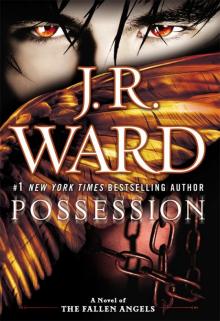 Possession
Possession The Beast
The Beast Lover Awakened
Lover Awakened Lover Reborn
Lover Reborn The King
The King Father Mine
Father Mine Lover Mine
Lover Mine Lover Eternal
Lover Eternal The Chosen
The Chosen The Shadows
The Shadows Lover Unleashed
Lover Unleashed Covet
Covet The Savior
The Savior Devil's Cut
Devil's Cut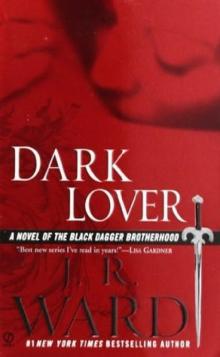 Dark Lover
Dark Lover Rapture
Rapture The Angels' Share
The Angels' Share Blood Vow
Blood Vow The Bourbon Kings
The Bourbon Kings The Billionaire
The Billionaire The Jackal
The Jackal Revealed
Revealed The Sinner
The Sinner The Jackal (Black Dagger Brotherhood: Prison Camp)
The Jackal (Black Dagger Brotherhood: Prison Camp) Immortal
Immortal Where Winter Finds You
Where Winter Finds You Blood Truth
Blood Truth A Warm Heart in Winter
A Warm Heart in Winter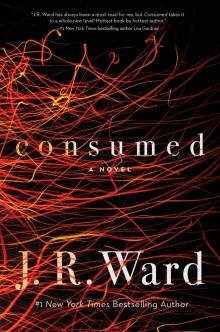 Consumed
Consumed Lover Reborn tbdb-10
Lover Reborn tbdb-10 The Black Dagger Brotherhood Novels 5-8
The Black Dagger Brotherhood Novels 5-8 Prisoner of Night
Prisoner of Night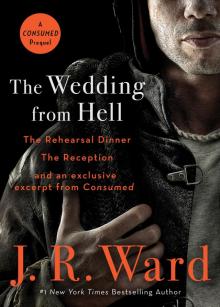 The Wedding from Hell Bind-Up
The Wedding from Hell Bind-Up Envy fa-3
Envy fa-3![Covet - A Novel of Fallen Angels [01] Read online](http://i1.bookreadfree.com/i/03/24/covet_-_a_novel_of_fallen_angels_01_preview.jpg) Covet - A Novel of Fallen Angels [01]
Covet - A Novel of Fallen Angels [01] The Rebel
The Rebel The Black Dagger Brotherhood
The Black Dagger Brotherhood The Rogue
The Rogue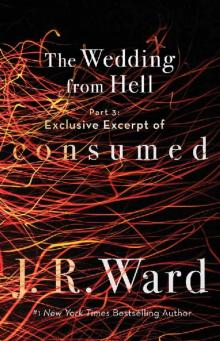 The Wedding from Hell, Part 3: Exclusive Excerpt of Consumed
The Wedding from Hell, Part 3: Exclusive Excerpt of Consumed Heart of Gold
Heart of Gold The Black Dagger Brotherhood_An Insider's Guide
The Black Dagger Brotherhood_An Insider's Guide![[Fallen Angels 01] - Covet Read online](http://i1.bookreadfree.com/i1/04/03/fallen_angels_01_-_covet_preview.jpg) [Fallen Angels 01] - Covet
[Fallen Angels 01] - Covet The Renegade
The Renegade Blood Fury: Black Dagger Legacy
Blood Fury: Black Dagger Legacy Rapture: A Novel of The Fallen Angels
Rapture: A Novel of The Fallen Angels Lover At Last: A Novel of the Black Dagger Brotherhood
Lover At Last: A Novel of the Black Dagger Brotherhood Lover At Last tbdb-11
Lover At Last tbdb-11 Lover Revealed tbdb-4
Lover Revealed tbdb-4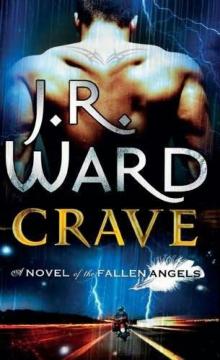 Crave fa-2
Crave fa-2 Lover Awakened tbdb-3
Lover Awakened tbdb-3 Lover Unleashed bdb-9
Lover Unleashed bdb-9 The Story of Son
The Story of Son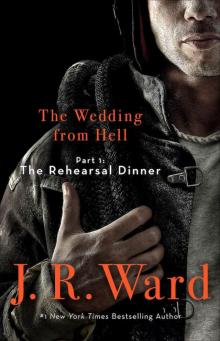 The Wedding from Hell_Part 1_The Rehearsal Dinner
The Wedding from Hell_Part 1_The Rehearsal Dinner An Irresistible Bachelor
An Irresistible Bachelor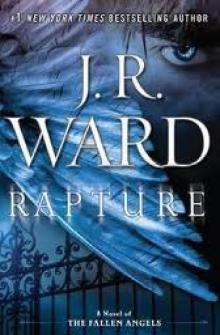 Rapture fa-4
Rapture fa-4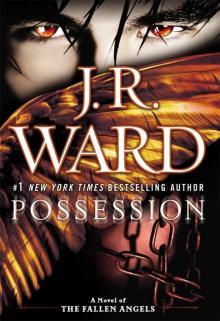 Possession fa-5
Possession fa-5 The Black Dagger Brotherhood Novels 1-4
The Black Dagger Brotherhood Novels 1-4 Lover Eternal tbdb-2
Lover Eternal tbdb-2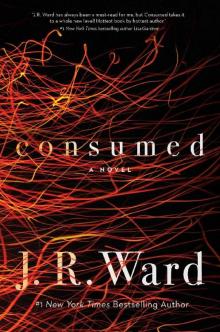 Consumed (Firefighters #1)
Consumed (Firefighters #1) Covet fa-1
Covet fa-1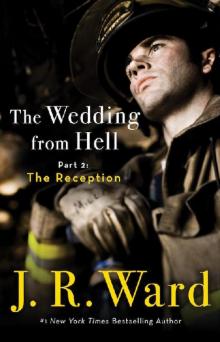 The Wedding From Hell: Part 2: The Reception
The Wedding From Hell: Part 2: The Reception Lover Reborn: A Novel of the Black Dagger Brotherhood
Lover Reborn: A Novel of the Black Dagger Brotherhood